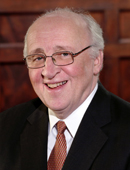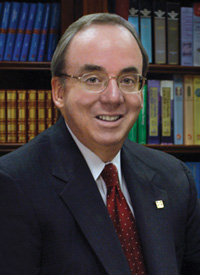The University of Notre Dame invited President Obama to be the keynote speaker and receive an honorary doctor of laws degree at commencement on May 17. The invitation has created an uproar from conservative Catholics, since the President has taken executive actions that oppose the Catholic Church’s teachings on life ethics. I interviewed Francis Beckwith, a professor at Baylor University who is spending a year as a visiting professor at Notre Dame.
I also posed similar questions to administrators who would be considered experts in religious higher education. Here are some more responses:
Richard Mouw, President of Fuller Seminary in California

My own sense is that commencements are for students and their families, and controversies should be avoided on those occasions. As a frequent commencement speaker, I am very much aware that people do not attend to hear the speaker, and that the best one can hope for is that the speech might have a line or so that sticks with the folks who attend. But they don’t need political controversy.
I am all in favor of having speakers on our campuses with whom we disagree. In the evangelical schools, we rightly insist on a kind of orthodoxy on the part of faculty – which means that for students to be exposed to in-the-flesh people with whom the school disagrees, guest lecturers are an important part of the educational process. But commencements ought not to have to carry that kind of baggage.
The wrinkle in this case, of course, is the fact that the proposed speaker is the President of the United States – and one who symbolizes an important positive step forward for a nation (and a Christian community!) that needs to work diligently at healing the racial wounds of the past. But President Obama bears significant responsibility for this controversy. He had given those of us who support the right-to-life cause some hope that he would work to decrease the polarization on this and related issues. Instead this administration has taken an “in your face” approach on abortion and stem cell research – issues that are of great importance in Catholic and evangelical communities.
As someone who still has great respect for Mr. Obama, I am deeply disappointed in him on this particular set of policy questions. If I were the president of Notre Dame, I would withdraw the invitation to him as a commencement speaker and invite him to speak his mind on anything he wants to discuss in a public forum on dealing with divisive moral issues in a pluralistic society.
David S. Dockery, President of Union University

I am sure that the Notre Dame administration has thought through these things carefully prior to extending the invitation. Notre Dame has been inviting presidents to speak at their graduation ceremonies for several decades. When a university invites an outside speaker to such a special event, it is almost always the case that the speaker is invited to speak “to the university community” and not to speak “for the university community.” I think that is a very important distinction to make. All of us from time to time have special speakers for special events who do not embody the mission and identity of the university.
But a university is best understood in many ways as a contest of ideas and so having various voices represented is to be expected. Yet, a commencement service is in many ways a blessing ceremony for the graduates and the institution normally wants someone who will speak in a way that will honor the graduates and the university community.
(Wheaton College invited Condoleezza Rice to speak at commencement even though she is pro-choice.)
There seems to me to a vast difference between Ms. Rice’s nuanced position on abortion and President Obama’s advocacy for full abortion rights and his lack of support for any aspects of the pro-life effort. It is because this difference is so vast that the pushback from the Notre Dame faithful has been so energized.







